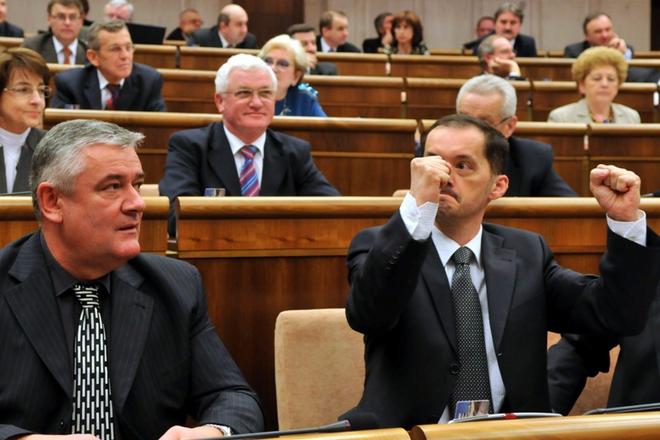SLOVAKS will hear their national anthem, see their national flag and read the preamble to their Constitution much more often than they did before now because on April 1, if President Ivan Gašparovič approves, a new Patriotism Act will come into effect. The law was passed by parliament at its early March session – an action that gave rise to a wave of disagreement across society as witnessed in the media world, in blogs and via online social networks.
According to the law, drafted by Ján Slota, the head of the Slovak National Party (SNS) and his right hand Rafael Rafaj, the beginning of each week at all Slovak schools and offices of the state administration as well as sporting events organised by national sports associations and all sessions of local, regional and national parliaments will start with the playing of the Slovak national anthem.
In addition, other Slovak national symbols: the coat of arms, the flag, the words of the national anthem and the preamble to the Constitution must be displayed in all classrooms of public schools as an effort towards patriotic education, one of the goals of the new legislation, according to its backers.
All state officials will also be obliged to swear an oath of fidelity to their homeland.
“Not only children, but also adults should be better patriots, and the state should create space for them to understand patriotism and I believe we managed to do this by passing this law,” Rafaj said.
The law proposed by SNS was supported by MPs from its coalition partners, Smer and the Movement for a Democratic Slovakia (HZDS). Smer, however, had objected to a part of the original proposal which would have required not only state administration bureaucrats but also mayors and every Slovak citizen to swear their fidelity when they are first issued their national IDs at age 15. These proposals were omitted from the final draft.
The law does not establish any sanctions for violations. However, the Sme daily wrote that the bodies that are responsible for schools – municipal or regional authorities – could interpret a violation of the Patriotism Act as a violation of one’s employment duties.
Critics of the new legislation mainly voiced their concern that what they called ‘forced patriotism’ might be counterproductive, especially for children at schools. Representatives of the Hungarian Coalition Party (SMK) said they were concerned that the state could misuse the new law to bully minorities. József Berényi from SMK said there are many ways in which it could be used as a tool for bullying, “whether they play the whole anthem, whether the disc is allright, whether the volume is high enough or not”, as quoted by Sme.
When the law comes into effect it will cause additional costs for the schools which must purchase the state symbols for each classroom from their own resources. Education Minister Ján Mikolaj said, as reported by the SITA newswire, that the additional expenses will not be very high and that schools will not get any additional money to buy them. According to calculations made by Sme, the overall cost for about 32,000 classrooms across Slovakia could be between €650,000 and €1.2 million.



 Ján Slota and Rafael Rafaj react as their law is passed. (source: ČTK)
Ján Slota and Rafael Rafaj react as their law is passed. (source: ČTK)